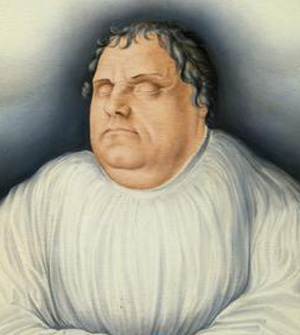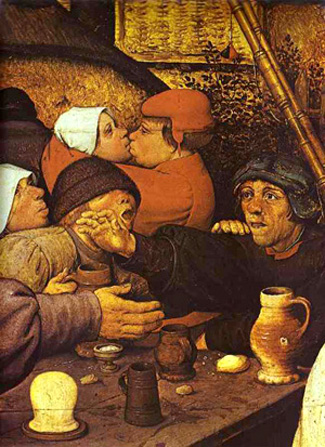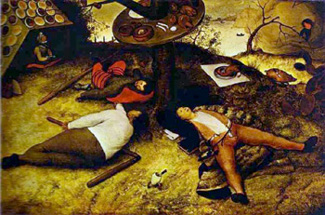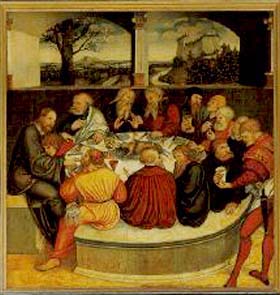I do not understand how contemporary Churchmen, including the most cultured, learned and illustrious, can mythify the figure of the heresiarch Luther in their eagerness to favor an ecumenical rapprochement with Protestantism, and indirectly with all religions, philosophical schools, etc. Don’t they see the danger that lies at the end of this road waiting for us all, that is, the formation on a world scale of a sinister supermarket of religions, philosophies and systems of every sort wherein truth and error will be presented all broken into pieces, mixed up and confused? Were it to reach this point, the world would no longer have the whole truth, that is, the Roman Catholic Apostolic Faith, unstained and unwrinkled.

A painting of Luther based on his death mask reveals his sensuous, slothful spirit |
From a certain aspect, Luther would be the departure point on that road to total confusion. Today I am publishing some more facts about Luther that demonstrate well the odor that his revolted figure would spread in that supermarket, or better said, in that morgue of religions, philosophies and of all human thought in general.
As I promised in the previous article, I will cite excerpts from the work of Fr. Leonel Franca SJ titled The Church, the Reform and Civilization (Rio de Janeiro: Editora Civilizacão Brasileira, 3rd ed., 1934, 558 pages).
One element absolutely characteristic of the teaching of Luther is the doctrine of justification by faith alone, independent of works. More clearly put, for him the superabundant merits of Our Lord Jesus Christ alone and of themselves would assure man of eternal salvation. According to this, one could lead a life of sin on this earth without remorse of conscience, without fear of the justice of God.
The voice of conscience was, for Luther, not that of grace, but the voice of the Devil.
For this reason he wrote to a friend that a man tempted by the Devil should at times “drink more abundantly, gamble, divert himself, and even commit some sin out of hatred and defiance for the Devil, in order to not give him opportunity to disturb his conscience with trifles … The whole Decalogue should be wiped away from our eyes and souls because we are so persecuted and molested by the Devil” (Luther, Briefe, Sendschreiben und Bedenken, ed. De Wette, Berlin, 1825-1828, in L. Franca, op. cit., pp. 199-200).

Depictions of the excesses of peasants unleashed by Luther's revolution. Above, the Peasant Dance by Jan Steen; below, The Land of Cockaigne by Pieter Brueghel the Elder
 |
Along these lines, he also wrote: “God only obliges you to believe and to confess. In everything else, He leaves you free to do whatever you want, without any danger to your conscience. Further, it is certain that He does not care if you leave your wife, flee from your master, or are not faithful to any obligation. What is it to Him if you do or do not do such things?” (Werke, ed. de Weimar, 12, pp. 131ff., in ibid., p. 446).
Perhaps even more categorical is this incitement to sin, written in a letter to Melanchton dated August 1, 1521: “Be a sinner, and sin boldly (esto peccator et pecca fortiter) but even more boldly believe and rejoice in Christ, the conqueror of sin, death and the world. During this life we must sin. It suffices that, by the mercy of God, we know the Lamb who takes away the sins of the world. Sin will not separate us from Him, even if we were to commit a thousand murders and a thousand adulteries a day” (Briefe, Sendschreiben und Bedenken, 2, p. 37, in ibid., p. 439).
This doctrine is so radical that Luther himself could hardly believe it: “There is no religion in the whole world that teaches this doctrine of justification. I myself, even though I teach it publicly, have a great difficulty in believing it privately” (Werke, 25, p. 330, in ibid., p. 158).
Luther himself recognized the devastating effects of such admittedly insincere preaching: “The Gospel today finds adherents who are convinced that there is nothing except a doctrine that serves to fill their bellies and give free reign to all their impulses” (Werke, 33, p. 2, in ibid., p. 212).
As for his evangelical followers, Luther added that “they are seven times worse than they were before. After preaching our doctrine, men have given themselves over to stealing, lying, trickery, debauchery, drunkenness, and every kind of vice. We have expelled one devil (the papacy) and seven worse have entered.” (Werke, 28, p. 763, in ibid., p. 440).
“After we understood that good works were not necessary for justification, we became much more remiss and colder in the practice of good … And if we could return today to the prior state of things and if the doctrine that affirms the necessity of doing good works could be revived, our eagerness and promptness in doing good works would be quite different” (Werke, 27, p. 443, in ibid., p. 441).

Over the altar of the Protestant church of Wittenberg, Lucas Carnach replaced the Apostles in the Last Supper with Luther, Melanchton and other Protestant leaders |
All these insanities explain how Luther reached the frenzy of satanic pride, saying of himself: “Does this Luther seem to you an extravagant man? As for me, I think that he is God. Otherwise, how could his writings or his name have the power to transform beggars into lords, asses into doctors, swindlers into saints, and slime into pearls?” (Ed. Wittemberg, 1551, vol. 4, p. 378, in ibid., p. 190).
At other times, Luther’s opinion of himself was much more objective: “I am a man placed and involved in society, in dissolutions, carnal actions, negligence, and other wrongdoings, to which are added those of my office itself” (Briefe, Sendschreiben und Bedenken, 1, p 232, in ibid., p. 198). Excommunicated in Worms in 1521, Luther gave himself over to idleness and sloth.
On July 13, he wrote to another Protestant leader, Melanchton: “Here I find myself, mindless and hardened, established in idleness. Oh woe! Praying little and no longer wailing for the Church of God because I burn and blaze in my untamed flesh. In short, I who should have fervor of spirit, have fervor of the flesh, licentiousness, sloth, idleness and somnolence (Ibid, 2, p. 22, in ibid., p. 198).
In a sermon preached in 1532: “As for me, I confess – and many others could undoubtedly make the same confession – that I am as neglectful in discipline as in zeal, much more negligent now than under the papacy. Today, no one has the zeal for the Gospel that they used to have in the past” (Saemtliche Werke, ed. de Plochman-Irmischer, 28 (2), p. 353, in ibid., p. 441).
What similarity can be found, then, between the morals of Luther and that of the Holy Roman Catholic Apostolic Church?

Posted on February 4, 2008

Related Articles of Interest
 Luther: No! Absolutely No! Luther: No! Absolutely No!
 The October Revolution The October Revolution
 Non Possumus Non Possumus
 Card. Willebrands: Luther is our common master Card. Willebrands: Luther is our common master
 Ratzinger gives Communion to Protestant Roger Schultz Ratzinger gives Communion to Protestant Roger Schultz
 Schutz converted. You are wrong. Read the response Schutz converted. You are wrong. Read the response
 Paul VI with Protestants he invited to help write the New Mass Paul VI with Protestants he invited to help write the New Mass
 John Paul II kisses the hand of Rowan Williams John Paul II kisses the hand of Rowan Williams
 Protestant Oscar Cullmann considered Ratzinger a radical Protestant Oscar Cullmann considered Ratzinger a radical

|